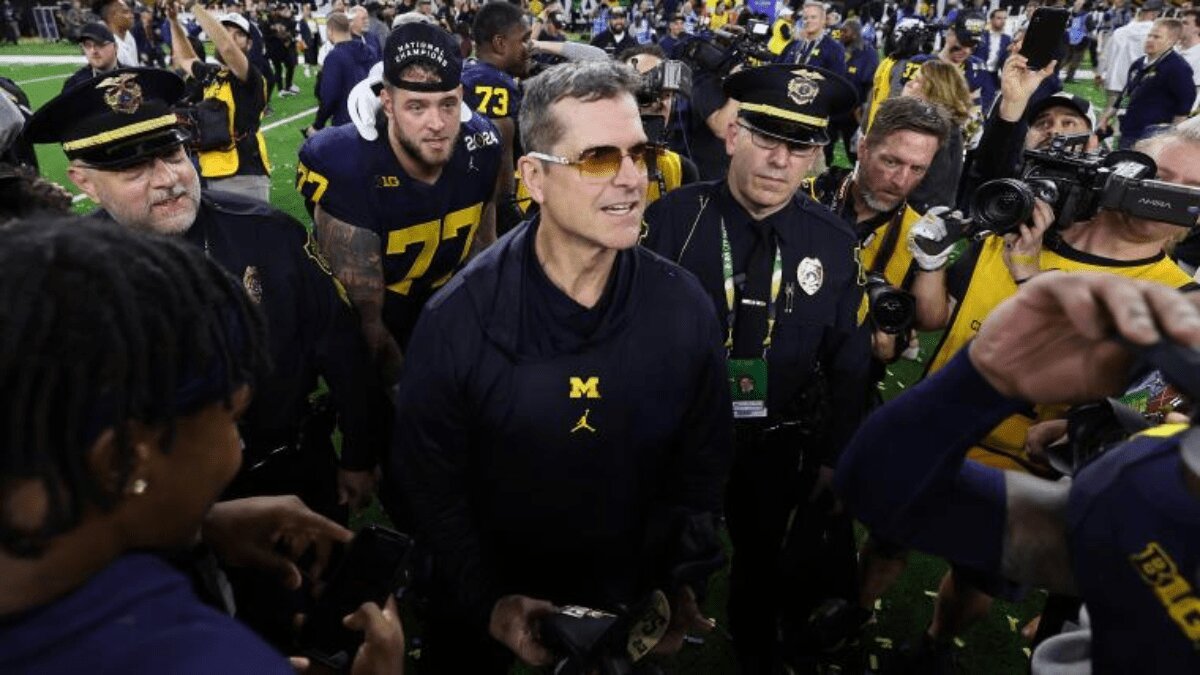Jim Harbaugh’s tenure as the head coach at Michigan seemed like it was coming to an end in 2020. That year, the Wolverines had a rough season, worsened by the pandemic, and had gone six years without making it to the College Football Playoff under Harbaugh’s leadership.
It was surprising, then, that just as Michigan’s football program began to improve, Harbaugh appeared to be preparing to leave. In 2021, he managed to break Michigan’s playoff drought by defeating Ohio State and reaching the College Football Playoff. However, he almost left to become the head coach of the Minnesota Vikings that offseason. The following year, after another playoff run, he even interviewed for the Denver Broncos’ head coach position.
In the 2023 season, Harbaugh led Michigan to a national championship, achieving a significant milestone for the program. Yet, this success marked the end of his time at Michigan, as he decided to return to the NFL, joining the Los Angeles Chargers in pursuit of a Super Bowl victory.
However, Harbaugh might not have been coaching at Michigan in 2024 even if he had stayed. The NCAA recently imposed a one-year suspension on Harbaugh due to one of two scandals that affected the program during his time there. This suspension adds another twist to his already eventful career and raises questions about his future in coaching.
Jim Harbaugh NCAA ban, explained
The NCAA has imposed a one-year suspension and a four-year “show-cause” order on Jim Harbaugh. This means that if Harbaugh were to return to coaching at the college level before 2029, he would be suspended for one year. Even after the suspension ends, he would be barred from all college football-related activities, such as team travel, practice, recruiting, and meetings, during the show-cause period.
This punishment isn’t related to the recent sign-stealing scandal but rather stems from an NCAA probe into Harbaugh’s recruitment practices during the COVID-19 pandemic. The investigation began after a receipt showed Harbaugh buying meals for recruits, which violated recruiting restrictions at the time. The NCAA also accuses Harbaugh of not being fully truthful during the investigation.
Michigan had already self-imposed a three-game suspension for Harbaugh in 2023 due to these issues, but this was a separate matter from the sign-stealing scandal that led to additional suspensions from the Big Ten.
Despite this new suspension, Harbaugh is currently focused on his NFL role with the Los Angeles Chargers, having left Michigan earlier this year. Given his current position and the state of the Chargers’ roster, which is being rebuilt for future success, it’s unlikely Harbaugh would return to college football before 2029.
There’s also speculation about the future authority of the NCAA. With changes in college football, like the increased player transfer freedom and potential shifts in conference affiliations, the NCAA’s power could diminish, making any penalties against coaches like Harbaugh less impactful.
A “show-cause” order is a penalty that makes it harder for a coach to be hired by a college program due to the required suspension, though it doesn’t outright prevent hiring. Coaches with show-cause penalties, like Jim Tressel and Chip Kelly, have still found jobs in college football after serving their penalties.
For now, Harbaugh’s new NCAA suspension is unrelated to the sign-stealing issue and likely won’t affect his current NFL coaching role. The NFL might consider NCAA suspensions but has typically avoided doing so, as seen in previous cases with other coaches.


